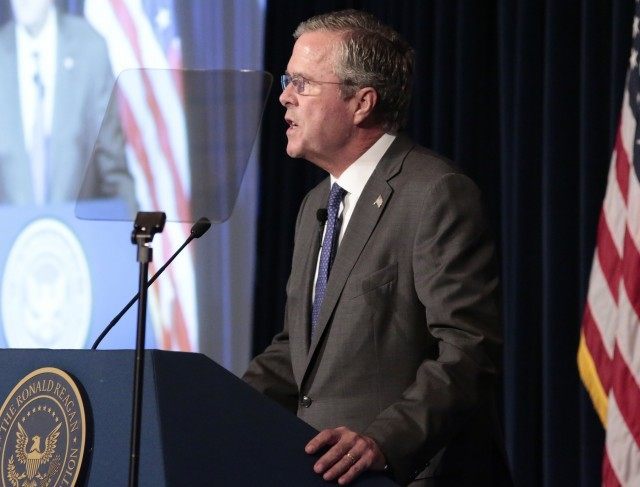Former Florida governor Jeb Bush spoke at the Ronald Reagan Library in Simi Valley on Tuesday night, focusing on foreign policy.
Bush focused his remarks on foreign policy, which has become one of the most prominent issues of the 2016 presidential campaign thus far, addressing the issue of Islamic terrorism in particular.
While Bush singled out Hillary Clinton’s role in some of the worst foreign policy failures, he failed to provide a sense of overall strategy, losing himself in the details.
Here are five key takeaways from his address:
1. Bush admitted that his brother made mistakes. “No leader or policymaker involved will claim to have gotten everything right in the region, Iraq especially,” Bush said. Yet the far greater mistake was the early, hasty withdrawal from Iraq after the success of the surge: “That premature withdrawal was the fatal error, creating the void that ISIS moved in to fill–and that Iran has exploited to the full as well.” Bush noted that Clinton had opposed the surge when she was a candidate, and was disengaged as Secretary of State, only visiting Iraq once.
2. Bush failed to clarify what he will do about the Iran deal. Recently, Bush puzzled observers by saying that the reason he would not cancel the Iran deal on his first day in office–as other candidates have promised to do–was that he would yet have his national security team in place (after months of transition). On Tuesday, he tried, and failed, to sound more decisive (emphasis added): “If the Congress does not reject this deal, then the damage must be undone by the next president–and it will be my intention to begin that process immediately.”
3. Bush does not seem to have grappled fully with Iran. In his remarks, Bush identified the Iranian regime as the main instigator of mayhem in the region: “Whenever bad things happen in the Middle East, from Israel’s borders to the shores of Yemen, the influence of the mullahs is rarely far from the scene.” Yet his policy is focused on Iraq and Syria. He contemplates a no-fly zone in Syria that might stop Iran from helping the Assad regime, but does not foresee the conflict that might follow. He says nothing about helping Iran’s reform movement.
4. Bush wants to support the Kurds. “If I am commander in chief, the United States will make certain that the Kurds have everything they need to win” against ISIS, Bush said. That is a welcome statement, since the Kurds are one of the few pro-American and self-governing groups in the region. Yet helping the Kurds is not as easy as it sounds. It would almost certainly frustrate Turkey, for example. And some of the Kurdish groups are terrorist or communist. Bush also did not explain how the Kurds fit into a broader vision for the region as a whole.
5. Bush wants to intervene in Syria. Bush’s idea is to “draw the moderates together and back them up, as one force” in Syria, then to help them “form a stable, moderate government once ISIS is defeated and Assad is gone.” It worked during the Iraq surge, he said. Yes, it did–with the addition of thousands of American troops on the ground. Bush was vague about whether he would use ground troops in Syria. And again, it is difficult to see how he will execute his strategy without confronting Iran, which wants to preserve Assad and divide Syria.

COMMENTS
Please let us know if you're having issues with commenting.